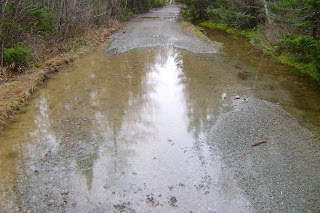For some people, the death of a grandparent signals little about their own mortality but the longevity and persistence of my elders and their familiar place in my life, makes their passing a significant remark on the finite nature of my internal clock.
I have had the pleasure of knowing most of my great-grandparents, and all of my grandparents; to have known them all well and had them see me in the fullness of my own adulthood. As the last of the grandparents left earth this year I could see that for everyone, even for those as rebellious as Beverly Haley, there is an end. And in her end I see my own future.
As for turning 40—it meant little. I kept feeling like I should feel some big weight or release. A new decade. But the dread/relief never arrived; a new day dawned and I changed one number on official documents.
This is also the year that I realized one of my life long ambitions; I learned to run. I have always wanted to run and finally found the key to success this year. I ran my first race, a 5 km in support of a Boston Bombing victim at the old Fort Devens army base just North of Boston in July. I ran that race with some of my cousins and it was one of the proudest moments of my year to cross the finish line under a burning sun.
Later in the summer I completed the 5 mile road race in my home town, a race my father had run regularly in his younger years. He, along with my kids, were at the finish line to watch me complete my first 5 mile race in just over 50 minutes. It was a major achievement.
But that was not enough road work...I ran the annual 5 mile road race during the Canso Regatta; the next town down the shore from mine, too.
I have medals from the 5 mile races and my race numbers. Those races were the highlights of my year. None of it was easy.
What may seem like an odd thing to mention, but in truth was also a major triumph, was the installation of a heat pump in my house. This year for the first time since I moved home I am not worrying about how I will heat the house and keep food in it at the same time this winter. That peace of mind, as well as comfortable temperature in the house, is a major event in the history of this year.
This year had its trials—My father was sick with something of unknown origin for months. He has never fully recovered but he's home after several months in the hospital and keeps on keeping on, doing all his usual activities.
As far as I can remember I was only in the ER twice this year-- admitted once for a night. That is a pretty good year for me. And I was not sick over Christmas which had been a common occurrence in my mid to late 20s.
We have had difficulties with the girls dad; he dropped all communication after his visit in July and that has been a constant source of stress for me and the kids. Hard to see them hurt and angry and be helpless to do anything about it.
My aunt died and my grandmother died on the same day and I was torn between heading to the States for my family there or staying here for my dad. I went to the States as I thought that it always seems after the funeral, after all the visitors have left, is the hardest time, and I knew I would be here for my dad at that time.
Those are the main turning points in my year. Overall I felt there was more good than bad and you have to be content with any year that chalks up well on the pro side of the chart.














 Cousin time
Cousin time



























